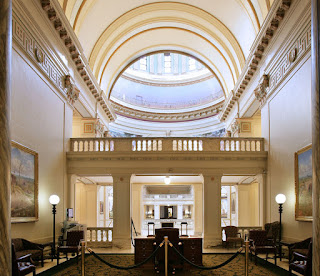OKLAHOMA CITY – Over $853 million in unnecessary state government spending of taxpayer dollars was outlined today by a group of lawmakers who want to use the savings to make Oklahoma a no-income-tax state.
The group is advancing a proposal to phase out Oklahoma’s personal income tax over 10 years.
“We believe Oklahoma should be the state where people keep more of the fruits of their labor than anywhere else,” said state Rep. Leslie Osborn, R-Mustang. “This will make us a magnet for job creators and set us on a path of vibrant economic growth and long-term prosperity.”
The group’s proposal aims to achieve full phase-out of the tax without raising other tax rates, negatively affecting core state government services, or harming retirees, senior citizens or veterans.
To do so, the lawmakers say their proposal requires a total of $525 million in total reductions in state government outlays that must be found over a two-year period. Because the savings can be found over two years instead of just one, annual savings found for Fiscal Year 2013 could also be counted again in Fiscal Year 2014 toward the total savings necessary.
In offering a list of $853 million in total savings options over the next two budget years, the lawmakers maintain there is plenty of room to reduce wasteful, unnecessary state spending while avoiding cutting core services, and still put Oklahoma on track to become the tenth state in the nation without a personal income tax.
“We can make these reductions and not touch one dollar of actual core spending in education, transportation, public safety, or the safety net for the truly needy,” said state Rep. David Brumbaugh, R-Broken Arrow. “In return, we can repeal our state’s income tax in a responsible amount of time and see an influx of new jobs and investment in Oklahoma at levels we’ve not seen before.”
The list of $853 million over two years includes savings from three areas: wasteful, inefficient or unnecessary state expenditures; corporate tax credits that have not exhibited a high enough return on taxpayer investment; and modernization, consolidation and technology reforms within state government bureaucracy that are still in the process of being implemented.
“Some of our colleagues may feel uneasy about eliminating taxpayer subsidies for things like golf courses or rodeos that may be in their home district,” said state Rep. Tom Newell, R-Seminole. “Or they may think it’s inconvenient to make state agencies operate efficiently. But our constituents sent us to the Capitol to use common sense and fix what needs fixing. And they don’t deserve for their hard-earned tax dollars to be spent wastefully.”
Newell said the goal in releasing the list was to compile credible savings ideas from several sources. Working from this list, the lawmakers hope to encourage their colleagues to build a consensus around which areas of nonessential state spending could be trimmed over the next two years.
One source lawmakers credited was the work in recent months by state Rep. David Dank, chair of the House Appropriations & Budget Subcommittee on Revenue & Taxation, and state Sen. Mike Mazzei, chair of the Senate Finance Committee, to bring attention to ineffective corporate tax credits.
Another acknowledged source was a recently released list of state budget reduction ideas from the Oklahoma Council of Public Affairs (OCPA), a free-market think tank.
State Rep. Charles Ortega said he and his colleagues, when examining the savings recommendations from these and other sources, adopted some and left others for another day.
“The goal here is to put together good ideas from several different places and start reaching a consensus on what’s possible, both politically and practically, in order to find enough savings to phase out our income tax,” said Ortega, R-Altus. “We have great respect for the ideas put forward in recent weeks and months by Chairman Dank, Chairman Mazzei, groups like OCPA and others. Some of these ideas have legs right now, and some may not. We believe repealing Oklahoma’s income tax is essential for our state, so we’re asking our colleagues to work with us to determine where we can reduce unnecessary taxpayer expenditures in order to make it happen.”
Click here to see a list of suggested cuts

No comments:
Post a Comment